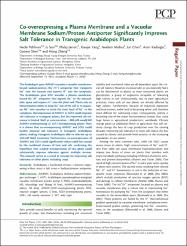Co-overexpressing a plasma membrane and a vacuolar membrane sodium/proton antiporter significantly improves salt tolerance in transgenic arabidopsis plants

View/
Access
info:eu-repo/semantics/openAccessDate
2016Author
Pehlivan, NeclaSun, Li
Jarrett, Philip
Yang, Xiaojie
Mishra, Neelam
Chen, Lin
Kadioglu, Asım
Shen, Guoxin
Zhang, Hong
Metadata
Show full item recordCitation
Pehlivan, N., Sun, L., Jarrett, P., Yang, X., Mishra, N., Chen, L., Kadioglu, A. (2016). Co-overexpressing a plasma membrane and a vacuolar membrane sodium/proton antiporter significantly improves salt tolerance in transgenic arabidopsis plants. Plant and Cell Physiology, 57(5), 1069-1084. https://doi.org/10.1093/pcp/pcw055Abstract
The Arabidopsis gene AtNHX1 encodes a vacuolar membranebound sodium/proton (Na+/H+) antiporter that transports Na+ into the vacuole and exports H+ into the cytoplasm. the Arabidopsis gene SOS1 encodes a plasma membranebound Na+/H+ antiporter that exports Na + to the extracellular space and imports H + into the plant cell. Plants rely on these enzymes either to keep Na + out of the cell or to sequester Na + into vacuoles to avoid the toxic level of Na + in the cytoplasm. Overexpression of AtNHX1 or SOS1 could improve salt tolerance in transgenic plants, but the improved salt tolerance is limited. NaCl at concentration > 200mM would kill AtNHX1-overexpressing or SOS1-overexpressing plants. Here it is shown that co-overexpressing AtNHX1 and SOS1 could further improve salt tolerance in transgenic Arabidopsis plants, making transgenic Arabidopsis able to tolerate up to 250mM NaCl treatment. Furthermore, co-overexpression of AtNHX1 and SOS1 could significantly reduce yield loss caused by the combined stresses of heat and salt, confirming the hypothesis that stacked overexpression of two genes could substantially improve tolerance against multiple stresses. This research serves as a proof of concept for improving salt tolerance in other plants including crops.

















